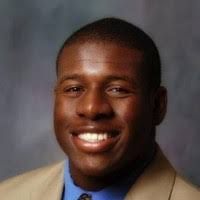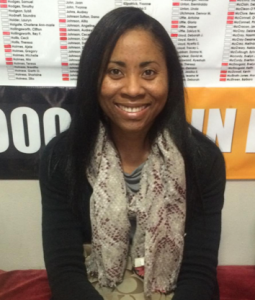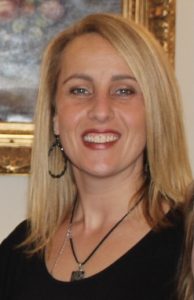This week is National School Counseling Week—a week dedicated to focusing attention on the unique contribution of school counselors within our schools.
During the COVID-19 pandemic, school counselors are more essential than ever to support students through these difficult times. Hiring more school counselors is part of President Biden’s $175 billion plan to return students to in-person learning.
“I always tell people that counselors are like the hub of the school,” says Stamford school counselor Aland Joseph. “We coordinate with everyone from teachers, nurses, custodial staff, administrators, therapists, psychologists—pretty much everyone goes through us.”
Joseph works at Westhill High School, the largest high school in Stamford. He has a caseload of approximately 230 students and says every counselor at the school has slightly different responsibilities from SATs, to English learners, to student athletes, to homeless students.

Westhill High School counselor Aland Joseph.
Joseph focuses on connecting students who are at high risk of failing out to the resources they need.
Adults who are not recent high school graduates may remember working with guidance counselors to discuss their college or career plans, but Joseph says that school counselors today focus on a lot more than college and career. “We do a lot of social and emotional support in this day and age so that students can be successful inside and outside of school.”
Joseph says it’s a difficult balancing act to provide teachers with the knowledge they need to be aware of a tough situation a student is going through while also respecting students’ right to and need for confidentiality about mental health issues and situations they may be facing. He says many students are facing difficult situations this year. Some have lost family members to COVID and others have parents who have lost their jobs.
The confidential nature of school counselors’ work is part of the reason Joseph says it’s hard for the public to understand what counselors do. “I have an intern this year, and she was very shocked at the amount of things, both good and bad, that happen throughout the day. She didn’t know how involved the job was.”
Supporting students of all ages
Though school counselors are still most commonly found at the secondary level, Connecticut elementary schools are increasingly hiring counselors to serve their students.
Seymour Elementary in East Granby now has a dedicated school counselor, Kashema Jennings, who works exclusively with the students at this third through fifth grade school. It’s a new role for Jennings, who has previously worked at the secondary level.

Kashema Jennings works at Seymour Elementary in East Granby.
Jennings says her days consist of frequent appointments with students and families, both in-person and remote, referrals to outside agencies, and working with the school’s SRBI team. She has noticed there are more parental referrals this year than she has seen in the past, many of which are related to students experiencing anxiety.
“Due to the pandemic, I think there’s a lot more need for social emotional learning,” Jennings says. “I’ve been glad to see that the state is making that a focus this year, as I think it’s definitely necessary.”
Jennings says she has always been a big proponent of educating children holistically, and that getting classroom teachers trained in social emotional techniques is beneficial to children. She says she would like to see school counselors and instructional staff working closely together to incorporate social emotional skills into daily classroom life.
Through her coursework at UConn, Jennings was trained to lead classes on social emotional skills, and is available to other staff members to lead weekly or monthly classroom lessons. She says that when students learn social emotional skills in the classroom it can help staff and students themselves identify issues before they reach a crisis level.
Jennings states, when meeting with students individually, it helps if they and their classmates already have the vocabulary necessary.
“For example, when it comes to identifying emotions, a student might say they feel ‘bad’ or ‘sad,'” Jennings says. “We want them to learn to identify more complex emotions like embarrassment, nervousness, or anxiety. Having that vocabulary makes it easier to identify problems.”
Jennings adds, “So often, low academic performance issues and behavioral issues have to do with students not getting adequate support. We want them to be great learners, but there can be many barriers for many students. Having school counselors in the building to help support students really increases their chances of success at all levels.”
Continuity of support
Montville High School counselor Allison Delaney says, “We get to know our students in eighth grade and we get to follow them through all four years and see them walk across the graduation stage. We’re with them for the whole journey, and that’s why I love my job.”
She adds, “I’ve seen so many students who struggled or thought they couldn’t do certain things, and now they are out in the world doing great things. It’s so rewarding seeing that and helping them along in that way.”

Allison Delaney works with ninth through twelfth graders at Montville High School.
Delaney says it can be hard for eighth graders to see the big picture when they start planning for high school, but that counselors are there to get to know students at a deep level and keep them motivated.
“When I was Christmas shopping this year, I saw one of my students who had a hard time in high school and now, a short time later, is the manager of a store I visited.”
Though Delaney does help prepare students for their future college and career goals, she says counselors “do way more than guide. We help students through so much. We look at the whole kid and work with school psychologists and social workers to get them on the right path.”
As has been the case for most educators, Delaney says that this year has meant recreating how to do everything. “We’re trying to still do everything we normally do, but all in a new way. The biggest thing for us is to support students’ mental health, but also to spread positivity and make sure students have the information they need.”
Delaney says counselors at her school have created a whole new website with virtual calming rooms, mental health supports, and other resources. “We’re connecting with students via social media and finding different ways to reach out to families and students.”
Delaney adds, “This year is like nothing we’ve ever seen before. We see students who have chosen to be fully remote who maybe haven’t been successful in school before and they’re doing fantastic, and then we see the complete reverse of that. It’s such a learning curve for everyone, but everyone is working so hard to make it work—the students and the staff. The school counselors I work with are amazing. I’m so blessed to have an amazing team.”
As for students and families who are facing challenges this year and don’t know who to reach out to, Delaney says, “If parents or students don’t know who to call, school counselors are like the Ghost Busters. Call us—we usually have the answer.”







